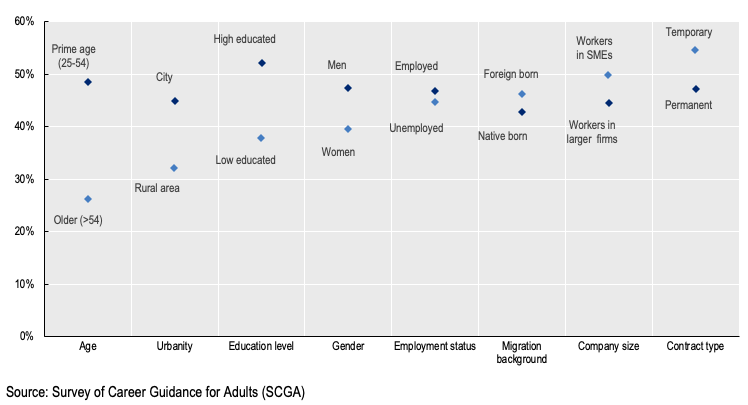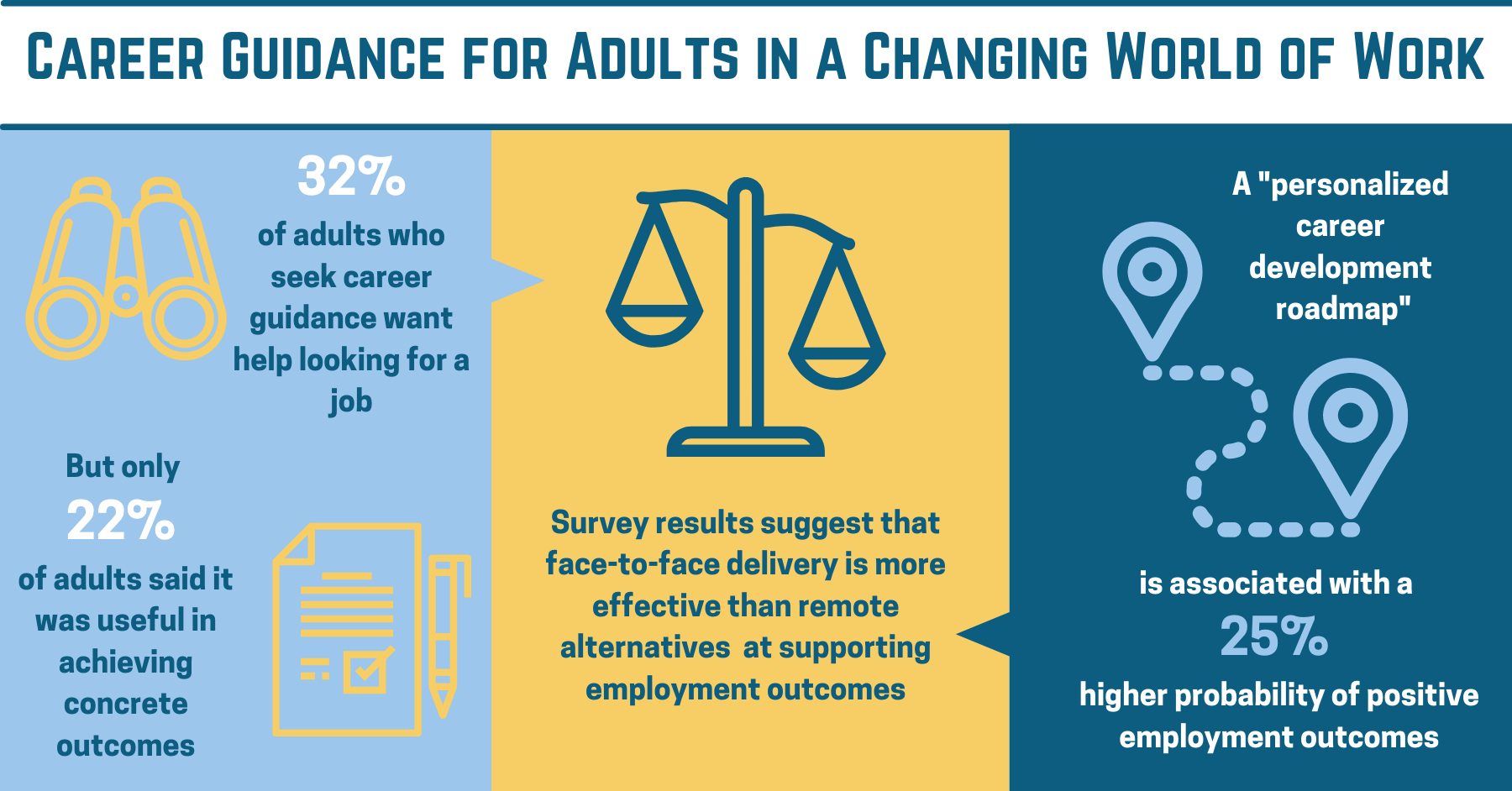Millions of adults have lost their jobs during the COVID-19 pandemic. According to Statistics Canada, the unemployment rate in Canada rose from 5.6% in February 2020 to 8.6% in December 2020 (down from a high of 13.7% in May). Some sectors, like tourism and hospitality, have been especially hard hit. Former hotel, airline and restaurant workers are now wondering how to retrain and for which jobs, and they have to answer these questions in a context of extreme uncertainty. But it’s not just the unemployed; many employed adults are in jobs or sectors undergoing significant change and they too will need to upskill and retrain. How can we best help these workers transition into new jobs and careers?
At a time like this, professional career guidance is an essential support in navigating a constantly evolving labour market. It can facilitate re-employment by identifying suitable new job opportunities and proposing relevant training.
With support from the JPMorgan Chase Foundation as part of the firm’s commitment to the future of work, a new OECD report fills information gaps in what we know about career guidance services for adults: What share of adults use career guidance? What distinguishes users from non-users? Are some types of career guidance more effective than others? The report draws from an online survey of adults’ experience with career guidance in six initial countries (New Zealand, the United States, Chile, Germany, France and Italy), as well as a policy questionnaire distributed to Ministries of Labour and Education in all OECD countries, including Canada. There are plans to extend the online survey to Canada in the coming months (see details below). In the meantime, the results from this first phase of the online survey sheds light on the career guidance experiences of adults in other OECD countries.
Katharine Mullock will be presenting a free webinar in partnership with CERIC and LMIC on “Adults’ Experience with Career Development: Findings from a New OECD Online Survey” on March 1. The webinar is part of a three-part series that will also feature Sareena Hopkins & Anthony Mantione. Learn more and register at ceric.ca/webinars.
How adults are engaging with career services
Contrary to perceptions that career guidance is just for young people in schools, the survey’s findings suggest substantial demand for career guidance among adults, with four out of 10 adults having spoken to a career advisor in the past five years. Moreover, most adults have multiple interactions with career guidance advisors. The most common reasons for seeking guidance are to receive help looking for a job (32%) and to learn about education and training options (25%).
“At a time like this, professional career guidance is an essential support in navigating a constantly evolving labour market.”
However, career guidance is not always perceived as being effective, which raises issues about the quality of the guidance offered. Only 22% of adults said it was useful in achieving concrete outcomes, like finding a job, progressing in one’s job or enrolling in a training program. Another issue is that many adults do not even get access to the career guidance they need. Those who face labour market disadvantages use career guidance less often. In particular, older individuals (age 55+), those living in rural areas and low-educated adults are much less likely than their counterparts to use career guidance (Figure 1).
Figure 1. Use of career guidance services, by socio-economic and demographic group
% of adults who have spoken with a career guidance advisor over the past 5 years, by group
Meeting the needs of clients and jobseekers
How career guidance is delivered also matters. Survey results suggest that face-to-face delivery is more effective than remote alternatives (telephone, videoconference, online services) at supporting employment outcomes. Face-to-face delivery remains the most common channel for adults to receive career guidance (63% of adults), although remote alternatives took precedence during the pandemic. This inevitable shift may have worsened access to guidance for adults with poor digital skills and those without a telephone or internet connection.
Career guidance is most effective when it is tailored to an adult’s particular needs and when it empowers them to take informed action. For adults who are in need of retraining but are unaware of their options, conducting a thorough assessment of their skills is a necessary starting point in designing individualized career and re-training pathways. Interviews are the most common method for assessing someone’s skills, but skills profiling and other tests are being used increasingly. Providing adults with a “personalized career development roadmap” – which spells out the necessary activities to achieve career and training objectives – is associated with a 25% higher probability of achieving positive employment outcomes and a 7% higher probability of enrolling in an education or training programme.
Career guidance outcomes are strongly influenced by the type of provider. While the public employment service is the most common provider of career guidance services, dissatisfaction with its services is generally high, possibly owing to overburdened counsellors with limited funding to tailor advice. Career guidance provided by employers or employer associations is positively associated with employment outcomes, and career guidance provided by education and training providers is positively associated with training participation.
The OECD report, Career Guidance for Adults in a Changing World of Work, offers the following general policy guidelines for improving adult career guidance systems:
- Expand availability of career guidance services, while ensuring that providers have capacity to meet the specialized needs of distinct groups (employed, unemployed, inactive) and being careful not to fully replace face-to-face delivery with remote alternatives, where possible.
- Improve the coverage and inclusiveness of adult career guidance systems by raising awareness about the value of career guidance and reaching out to disadvantaged groups.
- Improve the quality of career guidance services by monitoring outcomes, establishing quality standards and professionalising career guidance advisors. High-quality career guidance should be tailored to an individual’s needs, and informed by high-quality labour market information and skills assessments.
- Facilitate better coordination between all actors in the career guidance system by strengthening governance mechanisms.
- Ensure adequate funding of adult career guidance. Funding should be shared by governments, adults and employers in line with benefits and ability to pay.
The OECD is excited to be starting a new partnership with Canada’s Future Skills Centre and Labour Market Information Council, with an objective to review Canada’s system of adult career services and provide recommendations on how to strengthen it. We will consult with stakeholders in Canada’s career development system, including policy-makers and practitioners, to map out the institutional set-up and economic context. We will run an online survey to understand the Canadian adult’s experience with career guidance, and any barriers faced in accessing these services. The online survey will be an expanded version of the OECD Survey of Career Guidance for Adults, adapted to the Canadian context. It will allow for comparisons with other countries in the survey.
The need for quality career guidance for adults is not new, but its importance has been underscored by the pandemic. Several governments, including Canada, are offering subsidized training to adults who have lost their jobs or face diminished long-term employment prospects. Twinning this type of support with opportunities to speak with a career guidance advisor can help adults make more informed decisions about training that align with both their own interests and labour market demand. With support, workers affected by the COVID-19 crisis can be provided with effective help to acquire in-demand skills and transition successfully into new jobs.
Learn about career development strategies, resources and virtual events in our free CareerWise Weekly newsletter.






